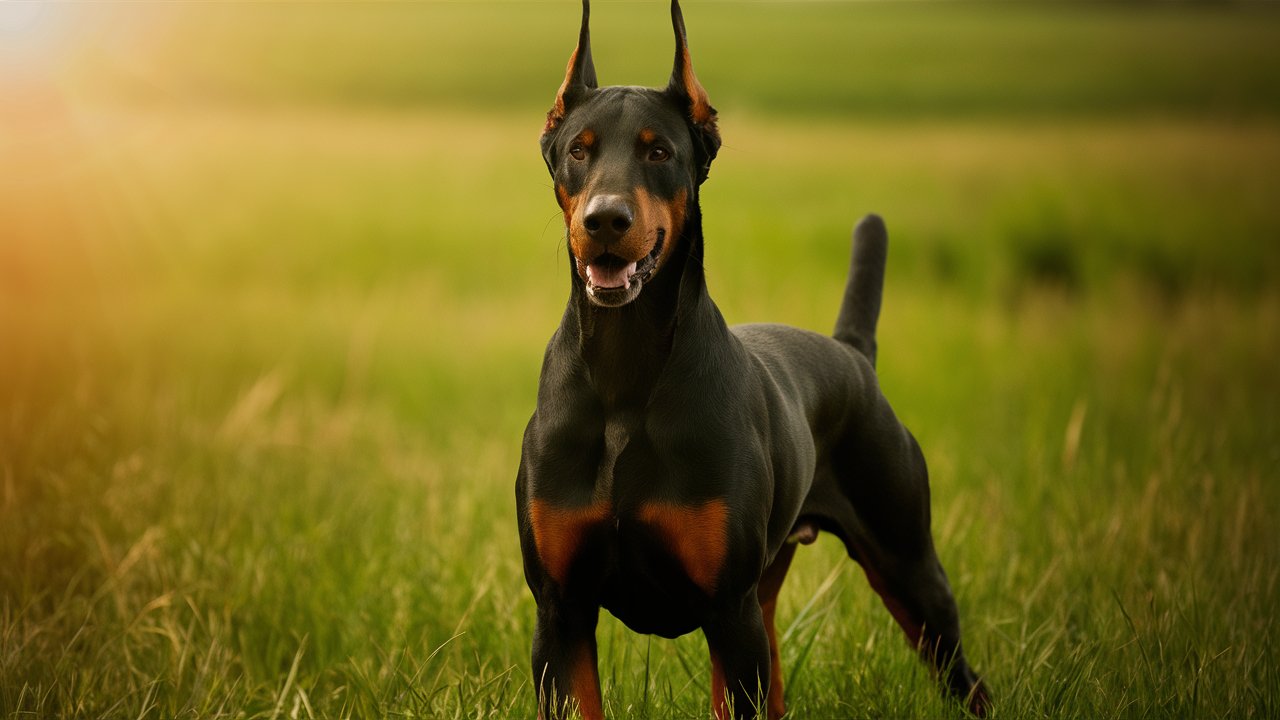5 Reasons the Dobermann is a Loyal and Intelligent Guardian
The Dobermann, often spelled “Doberman” in the United States, is a breed known for its intelligence, loyalty, and sleek, powerful build. This remarkable dog has earned a reputation as both a formidable guard dog and a loving family companion. In this article, we will delve into the history, characteristics, and care of the Dobermann, providing insights that can help you appreciate and understand this unique breed.
Table of Contents
ToggleThe Origins of the Dobermann

The Dobermann breed was developed in the late 19th century by Karl Friedrich Louis Dobermann, a tax collector from Apolda, Germany. Concerned about his safety during his rounds, Dobermann sought to create a dog that would offer protection and companionship. He selectively bred dogs that exhibited traits such as strength, loyalty, intelligence, and an imposing presence.
While the exact mix of breeds that contributed to the Dobermann’s development is unknown, it is believed that the Rottweiler, German Pinscher, Greyhound, and Weimaraner played significant roles. The result was a versatile dog that quickly gained popularity for its work as a guard dog, police dog, and even in search and rescue operations.
Characteristics and Temperament
The Dobermann is a medium to large-sized dog, with males typically weighing between 75-100 pounds and females between 60-90 pounds. They stand between 24-28 inches tall at the shoulder. Their coat is short, sleek, and comes in a variety of colors including black, red, blue, and fawn, often with rust-colored markings on the face, chest, and legs.
One of the most notable traits of the Dobermann is its intelligence. Ranked as one of the smartest dog breeds, Dobermanns are quick learners and excel in obedience training. This intelligence, coupled with their loyalty, makes them highly trainable and responsive to commands.
However, their intelligence also means they require mental stimulation. Without adequate mental and physical exercise, Dobermanns can become bored and potentially develop destructive behaviors. This need for engagement makes them ideal for active families or individuals who can dedicate time to training and play.
A Personal Anecdote: Life with a Dobermann

As a proud owner of a Dobermann named Max, I can attest to the breed’s remarkable qualities. Max came into our lives when he was just a pup, and from the beginning, his intelligence and eagerness to learn were evident. Training sessions were a breeze, as he picked up commands with ease and always seemed eager to please.
One of the most memorable moments with Max occurred during a family hike. We were exploring a new trail when my youngest child tripped and fell. Max, who had been walking ahead, immediately turned back, assessing the situation. His protective instincts kicked in, and he stayed close to my child until he was back on his feet. This incident highlighted the Dobermann’s natural inclination to protect and care for their family, a trait that has endeared Max to us even more.
Health and Lifespan
Dobermanns are generally healthy dogs, but like all breeds, they are prone to certain health conditions. Some of the common health issues that can affect Dobermanns include:
- Dilated Cardiomyopathy (DCM): A serious heart condition that is prevalent in the breed. Regular veterinary check-ups and heart screenings are essential.
- Hip Dysplasia: A genetic condition that affects the hip joints, leading to arthritis and pain.
- Von Willebrand’s Disease: A bleeding disorder caused by a deficiency in a specific protein needed for blood clotting.
The average lifespan of a Dobermann is around 10-12 years, but with proper care, many live longer. Ensuring they have a balanced diet, regular exercise, and routine veterinary care can contribute to a long and healthy life.
Training and Socialization
Training and socialization are crucial for a Dobermann. Due to their protective nature and intelligence, early socialization helps ensure they grow up to be well-rounded dogs. Introducing them to a variety of people, places, sounds, and experiences as puppies can help prevent fearfulness and aggression.
Positive reinforcement training methods work best with Dobermanns. They respond well to praise, treats, and play as rewards for good behavior. Consistency and patience are key, as they can sometimes exhibit stubbornness.
The Dobermann as a Family Pet
Despite their reputation as fierce guard dogs, Dobermanns can be wonderful family pets. They are known for their gentle and affectionate nature towards their family members. They thrive in environments where they are included in daily activities and can form strong bonds with their human companions.
It’s important to note that Dobermanns are not suited to being left alone for long periods. They can suffer from separation anxiety, which can lead to destructive behavior. Families considering a Dobermann should ensure someone is home for most of the day or can arrange for a dog sitter or daycare.

Conclusion
The Dobermann is a breed that embodies loyalty, intelligence, and strength. Their history as protectors and companions speaks volumes about their versatility and enduring appeal. Whether serving as a guard dog, a police dog, or a beloved family pet, the Dobermann’s unique qualities make it a standout breed.
Owning a Dobermann comes with responsibilities, including proper training, socialization, and health care. However, the rewards of having such a devoted and intelligent companion far outweigh the challenges. As my experiences with Max have shown, life with a Dobermann is filled with loyalty, love, and the occasional adventure, making them a truly remarkable breed.





